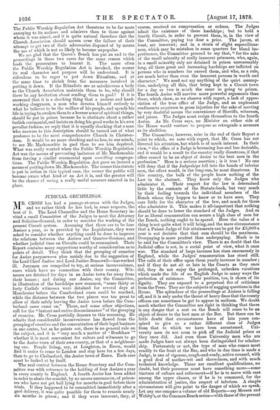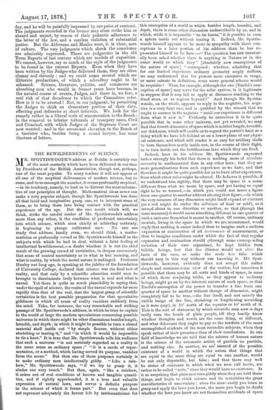JUDICIAL GRITMBLINGS.
MR. CROSS has had a passage-at-arms with the Judges, and we rather think he has had, in some respects, the best of it. The Lord Chancellor and the Home Secretary in- vited a small Committee of the Judges to meet the Attorney and Solicitor-General, in order to consider the working of the present Circuit system. Assuming that there are to be four Assizes a year, as is provided by the Legislature, they were asked to consider whether anything could be done to improve the relations between the Assizes and Quarter-Sessions, and whether judicial time on Circuits could be economised. Their Report contains many suggestions worthy of consideration as to points of detail. They think that the grouping of counties for Assize purposes—a plan mainly due to the suggestion of the Lord Chief Justice and Lord Justice Bramwell—has worked ill. Jurymen are compelled to try, at serious inconvenience, cases which have no connection with their county. Wit- nesses are detained for days in an Assize town far away from their homes ; and during one Assize, say the Committee, in illustration of the hardships now common, "some thirty or forty Carlisle witnesses were detained for several days at Manchester before the Cumberland cases could be reached, while the distance between the two places was too great to allow of their safely leaving the Assize town before the Cum- berland cases came on." These, and some other objections, call for the "instant and entire discontinuance " of the grouping of counties. Mr. Cross partially demurs to this reasoning. He admits that considerable inconvenience has flowed from the grouping of counties and the concentration of their legal business in one centre, but as he points out, there is no general rule on the subject, and it is "very much a matter of Bradshaw whether it is most convenient for suitors and witnesses to go to the Assize town of their own county, or that of a neighbour- ing one. People living, say, at Loughton, in Essex, would find it easier to come to London and stay here for a few days, than to go to Chelmsford, the Assize town of Essex. Each case must be looked at by itself.
The real contest between the Home Secretary and the Com- mittee was with reference to the holding of four Assizes a year in every county in England. A fourth Assize has been added in order to abate the scandal, by no means uncommon, of prison- ers who have not got bail lying for months in gaol before their tnals. If they happened to be committed immediately after a gaol delivery, it was quite possible for them to remain nearly six months in prison ; and if they were innocent, they, of course, received no compensation or redress. The Judges admit the existence of these hardships ; but to hold a fourth Circuit, in order to prevent them, is, in the view of the Committee, paying too dear a price. The jurors, at least, are innocent; and in a strain of slight supercilious- ness, which may be mistaken in some quarters for bland im- pertinence, the Committee proceed to say that, "for the sake of the small minority of really innocent prisoners, who, again, in a small minority only are detained in prison unreasonably long, all these great and increasing hardships are inflicted on persons who in numbers far exceed them, and who, as a rule, are much better than even the innocent persons in worth and character." We need not say anything of the quiet assump- tion, underlying all this, that being kept in a Circuit town for a day or two is much the same as going to prison. The fourth Assize will survive more powerful arguments than these, which show, as we observe with regret, a lack of appre- ciation of the true office of the Judge, and an unpleasant readiness to acquiesce in gross injustice for the sake of meeting by very doubtful means the convenience of Sheriffs, witnesses, and jurors. The Judges must resign themselves to the fourth Assize. As Mr. Cross says, no Minister on either side of the House would venture to propose so retrograde a measure as its abolition.
The Committee, however, raise in the end of their Report a point to which, we note with regret, that Mr. Cross has not directed his attention, but which is of much interest. In their view, " the office of a Judge is becoming less and less desirable, and it would be a result to the country really disastrous, if that office ceased to be an object of desire to the best men in the profession." Here is a serious assertion ; is it true ? No one will deny that if the Judgeships fell into the hands of inferior men, the effect would, in the long-run, be most disastrous. In this country, the bulk of the people know nothing of the Law in the abstract. They know only the Judges who administer it. Their respect for the law is determined little by the contents of the Statute-book, but very much by their feeling towards the individual members of the Bench whom they happen to know or to have seen. They care little for the character of the law, and much for those who administer it. This makes it all-important that nothing should be done to lower the standard of the Judges. And so far as liberal remuneration can secure a high class of men for the Bench, nothing ought to be spared. Here the value of a thing is not quite what it will bring, and the mere circumstance that a Puisne Judge of fair attainments can be got for £5,000 a year is not decisive that that sum should be the maximum.
Overpaying is more prudent than underpaying. Much is to be said for the Committee's view. There is no doubt that the Judicial office is not, in a social point of view, what it once was. The standard of large incomes has risen enormously in England, while the Judges' remuneration has stood still. The calls of their office upon them yearly increase in number ; and if they do not sit so late in the Courts as they once did, they do not enjoy the prolonged, unbroken vacations which made the life of an English Judge in many ways the perfection of existence. Their position, too, is shorn of its dignity. They are exposed to a perpetual fire of criticisms from the Press. They are the subjects of nagging questions in the House. The splendour of the proceedings at Assizes is falling off, and it is only under the threat of heavy fines that the county officers can sometimes be got to appear in uniform. We doubt much whether the Committee are right in thinking that there is any danger that a seat on the Bench will cease to be an object of desire to the best men at the Bar. But there can be little doubt that circumstances have of late years con- spired to give us a rather different class of Judges from that to which we have been accustomed. Uni- versity men do not seem to pick off the Judicial prizes as they once did. And even those University men who are made Judges have not always been distinguished for scholar- ship. Fortunately or not, the type of man who comes most readily to the front at the Bar, and who in due time is made a Judge, is one of vigorous, rough-and-ready, active counsel, with a good deal of mother-wit and shrewdness, and with much technical knowledge. These are excellent qualifications, no doubt, but their possessor must have something more—some tincture of culture and refinement—if he is to move with ease among the upper classes, or if he is to command, for the administration of justice, the respect of inferiors. A simple circumstance will give point to the danger of which we speak. Let any one compare a volume of old Reports—say Meeson and Welsby's, or the Common Bench series—with those of the present day, and he will be painfully impressed by one point of contrast. The judgments recorded in the former may often strike him as absurd and unjust by reason of their pedantic adherence to the letter of the law, and a careless violation of substantial justice. But the Aldersons and Mules were, it is clear, men of culture. The very judgments which shock the conscience are admirably expressed. There are judgments in the old Term Reports of last century which are models of exposition. We cannot, however, say as much of the style of the judgments to be found in the current Reports. Even when they have been written by the Judges who delivered them, they are often clumsy and slovenly ; and we could name several which are illiterate productions, of which a schoolboy ought to be ashamed. Science, literature, politics, and commerce are absorbing men who would in former years have become, in the natural course of events, Judges, and there is, we fear, a real risk of that decadence to which the Committee refer. How is it to be averted ? Not, in our judgment, by permitting the Judges to shirk an elementary portion of their duty, effecting goal deliveries at short intervals. We look for the remedy rather in a liberal scale of remuneration to the Bench ; in the removal to inferior tribunals of trumpery cases, Civil and Criminal, with which Judges of the Supreme Court are now worried ; and in the occasional elevation to the Bench of a barrister who, besides being a sound lawyer, has some tincture of letters.































 Previous page
Previous page